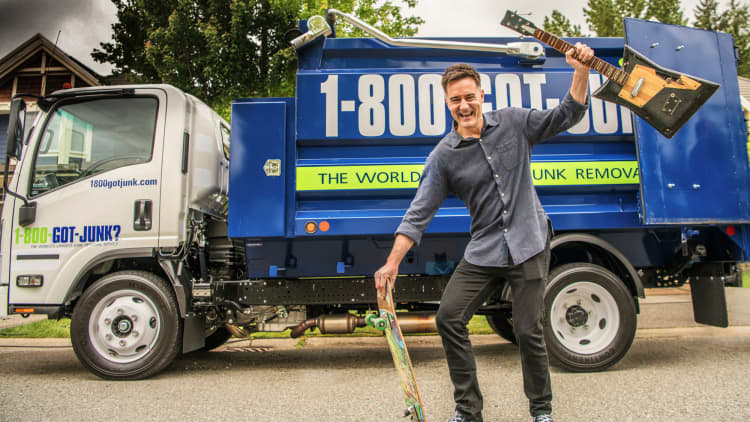There are countless stories of successful businesses and entrepreneurs who overcame past failures on their way to making it big. Billionaires like Mark Cuban, Bill Gates and Richard Branson have talked about how learning from their setbacks helped pave the way for their success.
But that doesn't make failing any less painful, especially when there's a lot of money on the line.
A recent report from CB Insights looks at more than 200 of the biggest and costliest start-up failures ever. The list includes a range of high-profile startup failures, from Elizabeth Holmes' alleged Theranos fraud to Pets.com, the poster child of the 2000 dot-com bubble's bursting.
The most expensive start-up failure documented by CB Insights is LeSports, a live sports streaming arm of onetime Chinese tech giant LeEco. LeSports raised a total of $1.7 billion in funding from a group of investors that included venture capital firms HNA Capital, Caissa Travel, Zhongtai Securities, and Fortune Link, according to CB Insights.
However, after establishing its LeSports subsidiary in 2014, LeEco ran into problems with cash shortages as founder Jia Yueting had piled up the company's debt in order to fuel expansion. In 2019, after facing scandals in China over his companies' excess debt and questionable accounting practices, Yueting filed for bankruptcy while owing roughly $3.6 billion to creditors. LeSports parent company LeEco continues to operate a streaming video service in China, as Le.com, but in May 2020 the company was delisted by the Shenzhen Stock Exchange after losing more than $1.6 billion in 2019.
Here's a look at five of the other most notable start-up failures in the CB Insights report:
Blood-testing fraud Theranos
Holmes dropped out of Stanford to found Theranos in 2003 and her promises of faster, cheaper and more accurate blood-testing devices fueled the massive hype around the company that would raise more than $500 million and be valued as high as $9 billion. However, the company ceased operations in September 2018, months after Holmes and former Theranos president Ramesh "Sunny" Balwani were charged with "massive fraud" by the SEC for allegedly falsifying the company's revenue as well as blood-test results.
Prior to its exposure as a fraud, Theranos had raised money from deep-pocketed, high-profile investors such as Rupert Murdoch, Walgreens and BlueCross BlueShield's venture capital arm. Holmes reached a settlement with the SEC in 2018, but she still faces a criminal trial (she's charged with nine counts of wire fraud and two counts of conspiracy to commit wire fraud) that's set to start in March 2021.
Fitness tracker failure Jawbone
San Francisco-based Jawbone was a much-hyped startup in the saturated "wearables" market, earning a valuation as high as $3.2 billion by 2014 on the promise of a fitness-tracker, called UP, that aimed to take on the Fitbit. Venture capital investors such as Sequoia Capital, Kleiner Perkins Caufield & Byers and Andreessen Horowitz backed Jawbone's bid to dominate the wearables market (then-Yahoo CEO Marissa Mayer even joined the company's board).
But despite raising more than $900 million, the company still only had less than 3% of the market for fitness trackers by 2015 as its products never sold well enough to justify the hype. Jawbone began liquidating its assets in July 2017.
Pet supply site Pets.com
Pets.com raised around $110 million from investors, including Amazon and Hummer Winblad Venture Partners, after launching in 1998 as an e-commerce site selling pet supplies. That makes the company's eventual failure far less costly than the other aforementioned start-ups, but Pets.com has become infamous for its collapse after the dot-com bubble burst in 2000.
The company, which famously bought an expensive Super Bowl ad in January 2000, launched an IPO a month later that raised $82.5 million. But Pets.com went under before the end of that year due to mounting losses from an unsustainable business model and overspending on advertising. The company began liquidation in November 2000.
Electric car start-up Better Place
Founded by Israeli entrepreneur Shai Agassi in 2007, Better Place was an electric car start-up that at one point looked like it might ride a similar wave of success as rivals like Tesla. The company raised more than $900 million, pulling in investors (including VantagePoint Capital Partners, General Electric and banking giants HSBC and Morgan Stanley) with an innovative idea to build battery-swapping stations, where the company's electric cars could swap out dead batteries for fresh ones in minutes, thus extending their range and reducing drivers' anxiety over the range of electric cars.
However, the logistics and high costs of building out the necessary infrastructure to make the battery-swapping idea work proved to be too difficult to overcome. Better Place ended up putting only about 1,000 electric cars on the road before filing for bankruptcy in 2013.
Solar panel-maker Solyndra
Founded in 2005, the solar panel manufacturer quickly became a hot ticket start-up that was even touted by the Obama Administration as an example of tech innovation in the clean energy sector. Solyndra went on to receive a $535 million federal loan guarantee while also raising more than $1.2 billion in fundraising from investors such as Redpoint Ventures, US Venture Partners and billionaire businessman major Obama donor George Kaiser (which makes it the costliest American company fail on CB Insights' list).
However, Solyndra's business cratered after the global prices for most solar panel components, like silicon, collapsed in 2011. The price drop helped Solyndra's competitors lower their prices, while Solyndra (which, unlike many of its rivals, built solar panels without polysilicon) could no longer be competitive. The company filed for bankruptcy in September 2011.
You can see CB Insights' full list of the biggest start-up failures here.
Check out: Americans spend over $5,000 a year on groceries—save hundreds at supermarkets with these cards
Don't miss:
The psychology of deception: How Elizabeth Holmes fooled everyone about Theranos for so long
Failing early in your career can make you more successful in the future
How failure helped 6 millennials launch a multimillion-dollar international start-up


